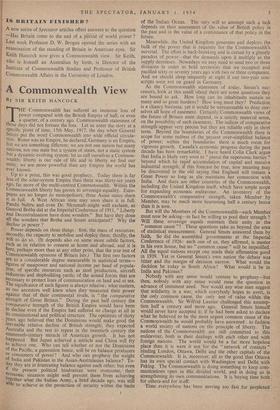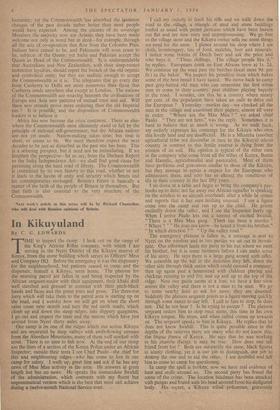A Commonwealth View
By SIR KEITH HANCOCK HE Commonwealth has suffered an immense loss of power compared with the British Empire of half, or even a quarter, of a century ago. Commonwealth statesmen of those days did not foresee the loss. Let us enter the story at a specific 'point of time, 15th May, 1917, the day when General Smuts put the word Commonwealth into wide official circula- tion. Rome was an Empire, he declared, Germany is an Empire, but we are something different; we are not one nation but many nations, not one state but a system of states, not a static system but a dynamic evolving system; let us call ourselves a Common- wealth; liberty is our rule of life and in liberty we find our unity; we are more powerful than any Empire the world has ever known.
Up to a point, this was good prophecy. Today there is far less of the solar-system Empire than there was thirty-six years ago, far more of the multi-centred Commonwealth. Within the Commonwealth liberty has grown to sovereign equality. Euro- peans are no longer its monopolisers; three Asian states share it in full. A West African state may soon share it in full. Pandit Nehru and even Dr. Nkrumah might well exclaim, as General Botha did at the Imperial Conference of 1911, " Liberty and Decentralisation have done wonders." But have they dono all the wonders that Botha and Smuts anticipated? Why the decline in power ? Power depends on three things : first, the mass of resources; secondly, the capacity to mobilise and deploy them; thirdly, the Will to do so. (It depends also on some more subtle factors, such as its relation to consent at home and abroad, and it is here, perhaps more than at any other point, that the true test of Commonwealth opinions of Britain lies.) The first two factors are to a considerable degree measurable in statistical terms— figures of manpower and national income per head of popula- tion; of specific resources such as steel production, aircraft industries' and shipbuilding yards; of the armed forces that are necessary to protect lines of communication on land and at sea. The significance of such figures is always relative: what matters, as our ancestors well knew when they 'measured their power against that of their continental rivals, is " the comparative strength of Great Britain." During the past half century the comparative strength of the British Empire would have been in decline even if the Empire had suffered no change at all in its constitutional and political structure. The optimists of thirty Years ago believed that the Dominions would make good the inevitable relative decline of British strength; 'they expected Australia and the rest to repeat in the twentieth century the nineteenth-century miracle of American growth. . It has not happened. But Japan achieved a miracle and China will fry to achieve one. Who can tell whether or not the Dominions of the Pacific, a generation hence, will be on balance producers or consumers of power? And who can prophesy the weight of India and Pakistan in the Asian-Australasian balance? To- day they are in frustrating balance against each other; but even if the present political hindrances were overcome, their economic situation might well prevent them from achieving together what the Indian Army, a brief decade ago, was still able to achieve in the protection of security within the basin of the Indian Ocean. The very will to attempt such a task depends on their assessment of the value of British policy in the past and in the value of a continuance of that policy in the future.
Meanwhile, the United Kingdom generates and deploys the bulk of the power that is requisite for the 'Commonwealth's survival. The effort is back-breaking and is cursed by a ghastly paradox of power—that the demands upon it multiply as the supply decreases. Nowadays we may need to send two or three divisions in order to hold territories that we occupied and pacified sixty or seventy years ago with two or three companies. And we should sleep unquietly at night if our two-year con- scripts were not on guard in Germany.
As the Commonwealth statesmen of today, Smuts's suc- cessors, look at this small island there are some questions they are bound to ask. How long can its inhabitants sustain so many and so great burdens? How long must they? Prediction is a chancy business, yet it would be unreasonable to deny our- selves all hope of easement. Certainly Commonwealth views of the future of Britain must depend, in a strictly material sense, on the possibility of such easement. The indices of comparative strength appear very precise but they are reliable only in short term. Beyond the boundaries of the Commonwealth there is scope for some redress of the present over-simplified balance of power; within the boundaries there is much room for vigorous growth. Canada's economic progress during the past decade has been remarkable. 1 have heard Colin Clark argue that India is likely very soon to " pierce the supersonic barrier" beyond which lie rapid accumulation of capital and massive industrial strength; if this forecast be true, new meaning may be discovered in the old saying that England will remain a Great Power so long as she maintains her connection with India. And there are other countries of the Commonwealth, including the United Kingdom itself, which have ample scope for expanding economic endeavour. An inventory of the Commonwealth's comparative strength, taken Member by Member, may be much more heartening half a century hence than it is now.
But will the Members of the Commonwealth—each Member must now be asking—in fact be willing to pool their strength ? Will these sovereign equals maintain their unity in the " common cause "? These questions take us beyond the area of statistical measurement. General Smuts answered them by faith. So did the assembled governments at the Imperial Conference of 1926: each one of us, they affirmed, is master in his own house, but no " common cause " will be imperilled. All the equal nations except one made their affirmation good in 1939. Yet in General Smuts's own nation the debate was bitter and the margin of decision narrow. What would the decision be today in South Africa? What would it be in India and Pakistan?
Nobody with any sense would venture to prophesy—but then, nobody with any sense would raise the question in advance of imminent need. Nor would any wise man suggest that solidarity in a war, which everybody hopes to avert, is the only common cause, the only test of value within the Commonwealth. Sir Wilfrid Laurier challenged this assump- tion half a century and more ago. General Smuts himself would never have accepted it; if he had been asked to declare what he believed to be the most urgent common cause of the Commonwealth he would probably have answered: to fashion a world society of nations on the principle of liberty. The nations of the Commonwealth are still committed to this endeavour, both in their dealings with each other and with foreign nations. The world would be a far more hopeless place than it is were it not for the " network of contacts " binding London, Ottawa, Delhi and the other capitals of the Commonwealth. It is, moreover, all to the good that Ottawa has its own special contact with 'Washington and Delhi with Peking. The Commonwealth is doing something to keep com- munications open in this divided world, and in doing so is strengthening its own communications. It is buying time both for others-and for itself.
Time everywhere has been moving too fast for perplexed humanity; yet the Commonwealth has absorbed the iinmense changes of the past decade rather better than most people would have expected. Among the citizens of its sovereign. Members the majority now are Asians; they have been made welcome not only in word but in deed-=for example, through all the acts of co-operation that. flow from the Colombo Plan. Indians have ceased to be, and Pakistanis will soon cease to be, subjects of the Queen; yet India and Pakistan accept the Queen as Head of the Commonwealth. It is understandable that Australians and New Zealanders, with their deep-rooted instinctive loyalties, should regret the breach of the old organic and symbolical unity; but they are realistic enough to accept the Commonwealth as it is. The telegrams that go every day from Canberra to Delhi are more numerous than those that Canberra sends anywhere else except to London. The nations of the Commonwealth are weaving between the civilisations of Europe and Asia new patterns of mutual trust and aid. Will these new strands prove more enduring than the old Imperial ties ? It is possible, and the di4iosition of Commonwealth leaders is to believe it.
Africa has now become the crisis continent. There as else- where the Commonwealth must ultimately stand or fall by the principle of national self-government; but the African nations are not yet made. Nation-making takes time; but time is short, or seems to be. We must therefore expect the next decades to he just as disturbed as the past one has been: This is a sobering prospect, but it need not be intimidating. If we lengthen the perspective—let us say, from the Durham Report to the India Independence Act—we shall find good cause for persisting along the hard road of liberty. The Commonwealth is committed by its own history to this road, whether or not it leads to the haven of unity and security which Smuts and his contemporaries envisaged. Britain's future is basically a matter of the faith of the people of Britain in themselves. But that faith is also essential to the very structure of the Commonwealth.











































 Previous page
Previous page